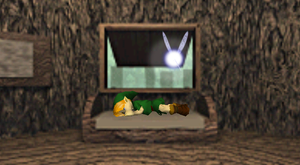| Don't like the ads? Then create an account! Users with accounts have more options than anonymous users. |
The Legend of Zelda: Ocarina of Time
 This article is a stub. You can help Triforce Wiki by expanding it.
This article is a stub. You can help Triforce Wiki by expanding it.
| The Legend of Zelda: Ocarina of Time | |
|---|---|

| |
| Developer(s) | Nintendo EAD |
| Publisher(s) | Nintendo |
| Release date | Nintendo 64: iQue Player: Virtual Console (Wii): Virtual Console (Wii U): |
| Genre(s) | Action-adventure |
| Rating(s) | ESRB: Everyone |
| Console(s) | Nintendo 64, Nintendo GameCube, iQue Player, Virtual Console (Wii, Wii U) |
| Mode(s) | Single player |
The Legend of Zelda: Ocarina of Time, often shortened to Ocarina of Time, is the fifth installment of The Legend of Zelda series, and it was released on the Nintendo 64 in late 1998. It is the first title of the series to feature 3D graphics. In 2000, the game received a direct sequel, The Legend of Zelda: Majora's Mask.
Prior to its release, The Legend of Zelda: Ocarina of Time was one of the most highly anticipated games of its time. Upon its release, the game won numerous awards, and many publications placed it on lists of the greatest video games of all time. The Legend of Zelda: Ocarina of Time was released on a 32-megabyte cartridge, which was the largest capacity Nintendo had produced at that time. It also introduced the target-lock system and context-sensitive buttons, which have subsequently appeared both in later The Legend of Zelda titles and similar games of its type, such as Star Fox Adventures.
The Legend of Zelda: Ocarina of Time eventually received a few ports, and even had its own remake for the Nintendo 3DS in 2011, The Legend of Zelda: Ocarina of Time 3D.
Story
 This section is a stub. You can help Triforce Wiki by expanding it.
This section is a stub. You can help Triforce Wiki by expanding it.
In the Kokiri Forest, all the Kokiri have a fairy provided to them by the Great Deku Tree, except for Link. Link has a nightmare of a young girl fleeing on a horse from a man in black armor. Meanwhile, the Great Deku Tree is nearing death, and he assigns Navi to be Link's guardian fairy, and requests Navi to bring him over. Navi wakes Link from his nightmare and directs him to meet the Great Deku Tree.
After equipping with a sword and a shield, Link and Navi go to meet The Great Deku Tree. The tree tells them that he was cursed by a "wicked man of the desert", who seeks to conquer the world, and that Link is the chosen one to stop him. The Great Deku Tree provides a test of courage to Link to enter inside him. After Link defeats the Queen Gohma within the Great Deku Tree, he rewards Link with the Spiritual Stone of the forest and instructs him to visit Hyrule Castle to speak with the princess of Hyrule. Just after providing this instruction, the Great Deku Tree dies.
Ports
In 2002, the game was re-released on the Nintendo GameCube with the title The Legend of Zelda: Ocarina of Time Bonus Disc, which features the original game and the newly playable Master Quest mode.
In 2003, The Legend of Zelda: Ocarina of Time was included on The Legend of Zelda: Collector's Edition as one of the four playable games. That same year, The Legend of Zelda: Ocarina of Time was released as a launch title for the iQue Player (a traditional Chinese translation was discovered to be under development in 2006 but was ultimately cancelled for unknown reasons.[1])
The Legend of Zelda: Ocarina of Time was later released on the Wii's Virtual Console in 2007. In 2015, the game was ported to the Wii U's Virtual Console.
Names in other languages
| Language | Name | Meaning |
|---|---|---|
| Japanese | ゼルダの伝説 時のオカリナ Zeruda no Densetsu: Toki no Okarina |
